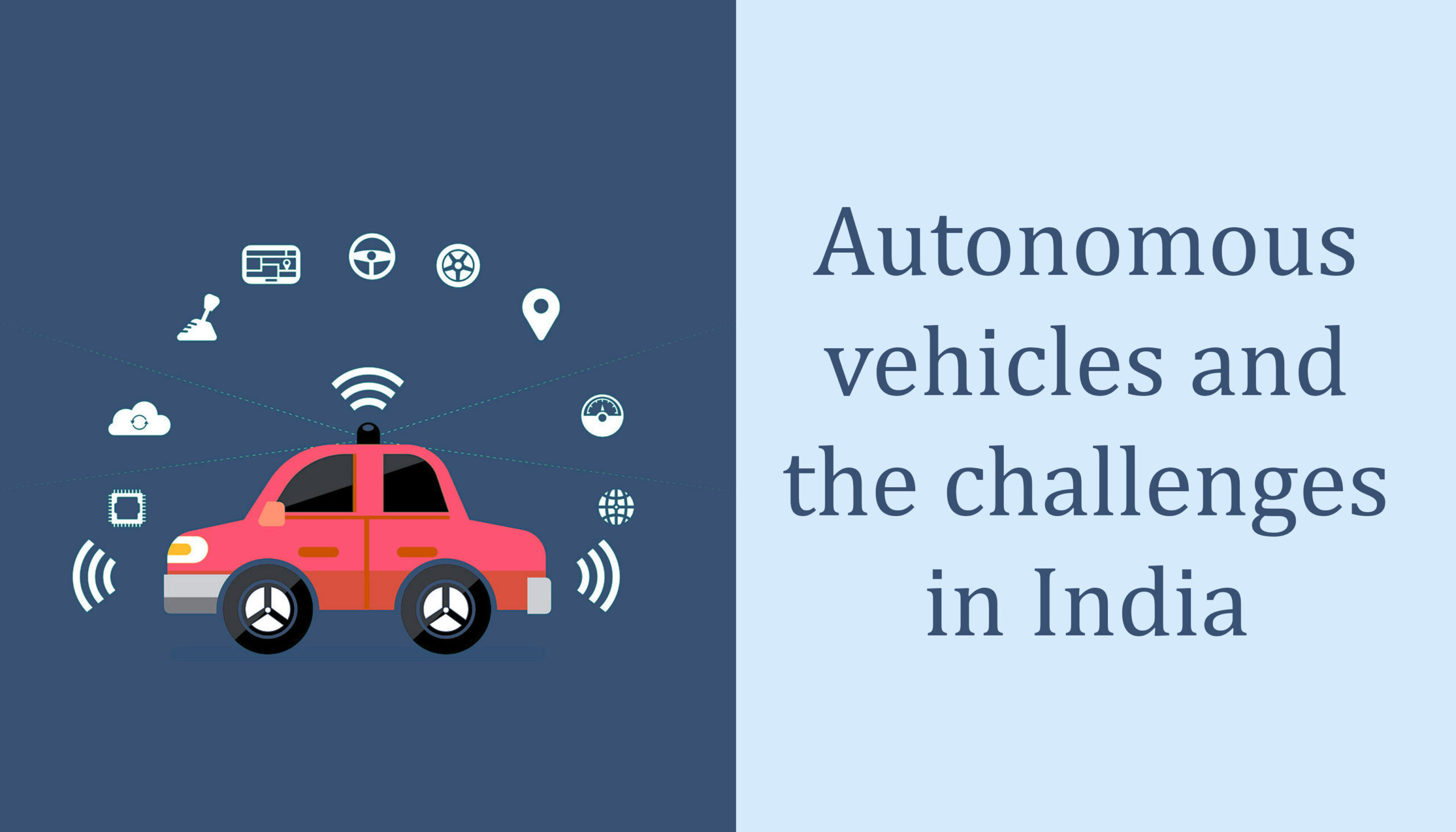In our previous blog we covered what are autonomous vehicles, what are the levels of autonomy, the general challenges for autonomous vehicles and the global regulatory status of autonomous vehicles. In this blog we will specifically look at the challenges and regulatory status of autonomous vehicles in India.
Autonomous vehicles & India
The automobile industry in India is one of the largest in the world which has a substantial contribution to the domestic employment, manufacturing and production sectors, exports, foreign trade, and revenue of the country.
Even then the growth and investment for autonomous vehicles in India is very low as most of the key players don’t see India as a major hub for AVs anytime soon, due to some of the following challenges:
-
Government feels the loss of jobs will be too high if autonomous vehicles are implemented in the country, as a lot of people’s livelihoods are dependent on their day-to-day earnings as cab or personal drivers
-
Lack of proper infrastructure in India is a primary issue, potholes, untarred roads etc. make it difficult for an autonomous vehicle to navigate at its current development levels
-
Non-compliance with the law, people are a lot more unconcerned about adhering to some of the daily regulations in the country; jaywalking, driving on wrong side, not following lane driving, over speeding, jumping red lights etc. are common daily occurrences in our country which no one thinks twice about
-
Highways, rural areas, and even big cities are prone to having animals roam around the streets, even animal pulled carts as well as herds sometimes block the roads completely
These are only some of general challenges an autonomous vehicle will have to overcome to be able to be utilised in India. Further if we delve into the regulatory aspect, then we are equally ill equipped, as India does not even permit the testing of automated vehicles under the existing regulations.
Legal obstacles in India
Motor Vehicles Act, 1988
Motor Vehicles Act, 1988 does not provide for autonomous vehicles in any capacity, including testing of autonomous vehicles on Indian roads under the current regulation. An amendment for the Motor Vehicles Act which allows for autonomous vehicle testing has been pending for over 4 years, with not much traction.
In fact, the best-case scenario would be to introduce a separate regulation dealing with autonomous vehicles in India
As the Act provides that only a person above the age of 18 who has a driving licence is permitted to drive a vehicle, the rule itself becomes redundant for autonomous vehicles, unless the government provides for a separate licence for autonomous vehicle users. And a bigger question being, can a minor be a passenger on a fully autonomous vehicle alone as they are not technically driving the car?
Further section 109 of the Motor Vehicles Act states, every motor vehicle shall be so constructed and so maintained as to be always under the effective control of the person driving the vehicle, which is not the case when it comes to autonomous vehicles
Further when it comes to the liability after an accident, wherein the insurer has to pay for the damages, who will be liable? The owner? the driver? Or the manufacturer?
In order to find solutions to these questions, the government needs to start at least working on the bill for autonomous vehicles testing in India as a first.
Consumer Protection Act, 2019
Under section 2(34) of the Consumer Protection Act, the definition of product liability is given as “the responsibility of a product manufacturer or product seller, of any product or service, to compensate for any harm caused to a consumer by such defective product manufactured or sold or by deficiency in services relating thereto”.
Adding to the point under Motor Vehicles Act, for all intents and purposes it is not possible that the owner or driver of a fully autonomous vehicle could have caused an accident themselves, so in this case, either the manufacturer or the software developer or both will have the liability for any damages cause by the autonomous vehicle
Assigning of responsibility and the scope of contributory negligence is something that will have to be defined by the regulations in order to remove ambiguity and allocate the responsibility to the correct party
Information Technology Act, 2000
Right to privacy is considered as a fundamental right in India, but India has not yet enacted a specific legislation on data protection. However, the Indian legislature did amend the Information Technology Act (2000) to include Section 43A and Section 72A, which give a right to compensation for improper disclosure of personal information.
The government subsequently issued the Information Technology (Reasonable Security Practices and Procedures and Sensitive Personal Data or Information) Rules, 2011 under Section 43A of the IT Act. The Rules have imposed additional requirements on commercial and business entities in India relating to the collection and disclosure of sensitive personal data or information.
Under the Sections 43, 65 and 66 of the Act, tampering, hacking, or damaging of computer or computer system is the situation where someone who, with the intent to cause wrongful loss or damage, or knowledge of the same – destroys, deletes, or alters any information in a computer resource, or diminishes its value, or affects it injuriously by any means, is punishable by 3 years imprisonment or with fine or both.
The above provisions will be directly applicable to autonomous vehicles, the manufacturer, the owner, the occupant or a third person.
Amend a-way
Certain modifications and amendments will have to be made to the existing regulations and procedures in India to inculcate the development of autonomous vehicles in the country
-
Amending the Motor Vehicles Act to have a broader definition of operator of vehicle
-
The automated driving system can be defined as a separate entity, whose responsibility will lie either upon the software developer, manufacturer, or both
-
Determining the liability in case of an accident with an autonomous vehicle, owner of the vehicle has no control, so will it be the autonomous driving system? The manufacturer? Or the software developer? Or both?
-
Also, a new procedure for such incidents determining, whether it was a technical issue or a hack on the software running the vehicle by a third-party must be established.
-
Stricter laws for jaywalking and implementing basic traffic rules in towns, cities, and highways, this will generally help the traffic situation in India, and benefit development of autonomous vehicles as well.
-
Laws will also have to incorporate necessary provisions dealing with protection and responsible utilization of passenger/occupier data, along with increased penalties/punishment for threat of hackers and cyber espionage.
-
Ideally a new legislation for autonomous vehicles, covering their use, productions, liability, insurance, data protection etc.
The way ahead
About 95% of road accidents are caused by human error, but with the advancement in technology and through machine learning, most autonomous vehicle software systems are going to negate all human errors
The Indian government believes that more than a crore people will lose their jobs if autonomous vehicles are introduced in the country, as a decent percentage of the population work as drivers in some capacity, however, there will also be a huge increase of jobs in the IT & ITES industry, as the autonomous vehicle industry requires a great input from IT specialists. Utilizing a compliance management software can help you better prepare for the challenges faced by an autonomous vehicle company in India and the regulatory changes which it will have to adapt to.
If not immediately for public use, autonomous vehicles must be allowed initially for private usage and then slowly integrate it into public use as well, such as on demand taxis and long hauling
Reduction of road accidents, adherence to speed limits and lane driving, are just some of the benefits that will arise from usage of autonomous vehicles
Most importantly, testing of autonomous vehicles in India must be permitted and the long journey ahead of adapting our infrastructure and legislations must begin.
Written by: Viraj Ranjan Singh
Disclaimer
All material included in this blog is for informational purposes only and does not purport to be or constitute legal or other advice. This blog should not be used as a substitute for specific legal advice. Professional legal advice should be obtained before taking or refraining from an action as a result of the contents of this blog. We exclude any liability (including without limitation that for negligence or for any damages of any kind) for the content of this blog. The views and opinions expressed in this blog are those of the author/(s) alone and do not necessarily reflect the official position of Lexplosion Solutions. We make no representations, warranties or undertakings about any of the information, content or materials provided in this blog (including, without limitation, any as to quality, accuracy, completeness or reliability). All the contents of this blog, including the design, text, graphics, their selection and arrangement are the intellectual property of Lexplosion Solutions Private Limited and/or its licensors.
ALL RIGHTS RESERVED, and all moral rights are asserted and reserved.





